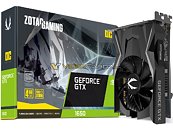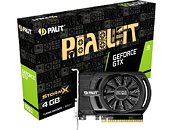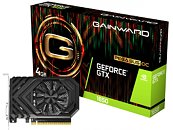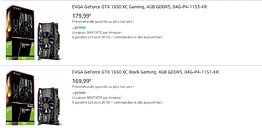Wednesday, April 17th 2019

NVIDIA GeForce GTX 1650 Specifications and Price Revealed
NVIDIA is releasing its most affordable graphics card based on the "Turing" architecture, the GeForce GTX 1650, on the 23rd of April, starting at USD $149. There doesn't appear to be a reference-design (the GTX 1660 series lacked one, too), and so this GPU will be a partner-driven launch. Based on NVIDIA's smallest "Turing" silicon, the 12 nm "TU117," the GTX 1650 will pack 896 CUDA cores and will feature 4 GB of GDDR5 memory across a 128-bit wide memory interface.
The GPU is clocked at 1485 MHz with 1665 MHz GPU Boost, and the 8 Gbps memory produces 128 GB/s of memory bandwidth. With a TDP of just 75 Watts, most GTX 1650 cards will lack additional PCIe power inputs, relying entirely on the slot for power. Most entry-level implementations of the GTX 1650 feature very simple aluminium fan-heatsink coolers. VideoCardz compiled a number of leaked pictures of upcoming GTX 1650 graphics cards.
Sources:
VideoCardz, VonGuru
The GPU is clocked at 1485 MHz with 1665 MHz GPU Boost, and the 8 Gbps memory produces 128 GB/s of memory bandwidth. With a TDP of just 75 Watts, most GTX 1650 cards will lack additional PCIe power inputs, relying entirely on the slot for power. Most entry-level implementations of the GTX 1650 feature very simple aluminium fan-heatsink coolers. VideoCardz compiled a number of leaked pictures of upcoming GTX 1650 graphics cards.




109 Comments on NVIDIA GeForce GTX 1650 Specifications and Price Revealed
It is rumoured to have the TU117-300 insted of the full activated TU117-400.
Ti will follow most likely.
That said, Its really hard for me to see much success for this card around the area of cards like the RX 580, albeit his multiplicatively higher power consumption
The niche it fills is 75W TDP so price/performance may not end up being the most important characteristic for it.
The performance gap is rather large though, I would expect a 1650Ti at some point as well.
These simple aluminium coolers will be horrible as usual though :(
www.newegg.com/Product/Product.aspx?Item=N82E16814137124
Also $150.
RX560 performs on par with GTX1050. 1650 will perform like the 1050Ti, if not better.
no one buy this.
this belongs in entry-level gaming laptops.wrong.
cards from this segment just never have made any sense price/performance wise,be it amd or nvidia. and lower you go in this sub-$150 segment,the worse it gets. I had radeon r7 250 back in the day and while it was cheap it was the worst investment to my PC I have ever made.sold it for 7870xt that cost 3x as much and I was super happy.
The card is fine. It may rise eyebrows on a niche forum like this one, but it'll be a bestseller. All GTX *50 were.
This card's main niche is 75W TDP. No power connectors, low power consumption. Stick it anywhere with a PCIe x16 slot.
You should add RX 560 here. That's the actual competitor.
RX570 will compete on performance, but is from a different segment.
It's not going to OC well but it's not an enthusiast card so it don't matter.
The RX 570 has a $129 variant everywhere so this is going to be a competitive against the 1650...
Seeing this makes me even more happy with the $80-ish (barely) used RX 570 I got a couple of months back :DAccording to TPU's GPU database, the RX 570 is 50% faster than the 1050 Ti. This is never, ever getting close to that. The specs simply aren't there.Depends how you define segment. Price-wise, it's very close, even if it draws more power. There's no denying Nvidia's efficiency and perf/W lead, but perf/$ is just as important.
Then again, I've shoehorned my RX 570 into an old Optiplex 990 SFF, which has a proprietary 240W PSU, and it runs perfectly fine alongside its (95W TDP, ~80W according to HWMonitor) i5-2400. The highest power draw I've seen at the wall is 265W, which with the PSU's abysmal efficiency rating of "65% mean" translates to less than 200W internally. Too much for the HDPlex 160, but still not much. I could probably blow up that PSU if I ran Prime95 and FurMark, though.
As for performance, I didn't spot that @londiste had the clock speeds listed further up in this thread, which makes the calculation in my previous post a bit off. Updated, but of course purely theoretical:
GTX 1050 Ti = 100
+16,7% shaders = 116,7
+ ~5% arch improvements = 122,5
+ (1485/1665Mhz base/boost clock vs. 1290/1392 for the 1050 Ti - let's go with boost clocks and call that) 19,6% clock speed increase = 146,5%
But then there's the memory bandwidth wrench thrown in the works, which only has a 14% increase, meaning this is far more bottlenecked by memory than the 1050 Ti, even if we're generous and say improved compression boosts that to 25% better effective bandwidth. My completely pulled-out-of-my-a** estimate (given that calculating the effect of a memory bottleneck takes far more than simple math, and will vary between applications) then lands us at about a 30% improvement over the Ti, smack-dab in the middle of it and the RX 570.
trog
As we've seen previously; Turing seems to be around 15% faster per core/shader than pascal. And with higher clocks it shouldn't be much of a problem. We are likely to see certain memory bandwidth limitations effecting some workloads, but overall this card is hardly going to be targeted for such workloads anyways. Think of it as a 1060 3gb but with even more sacrifices. Though perhaps what it loses in memory bandwidth it makes up with that extra 1GB or memory, who knows.